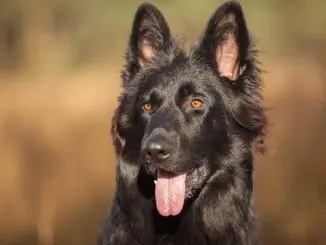The Pitbull German Shepherd Mix, a captivating blend of the intelligent German Shepherd and the resilient American Pitbull Terrier, has always intrigued me. This unique mix combines the best of both worlds, resulting in a dog with a striking appearance and a multifaceted personality. Their distinct characteristics and robust personality have made a lasting impression on me.
Each encounter with a Pitbull German Shepherd Mix reveals something new about this dynamic breed. They are not just pets but embodiments of strength and loyalty. The depth of their character and their unyielding devotion continue to amaze and inspire me.
These dogs stand out with their combination of traits from two iconic breeds, offering a rich and rewarding experience in canine companionship. Their story is a testament to the enduring bond between humans and dogs, a bond that is both profound and deeply rewarding. There’s more to hem beyond their physical traits. Keep on reading to learn more.
TABLE OF CONTENTS
- Pitbull German Shepherd Mix Overview
- Breed Origin and History of the German Shepherd Pitbull
- German Shepherd Pitbull Mix Appearance
- Personality and Temperament of the German Sheppit
- Feeding and Nutrition Guidelines for German Shepherd Pitbull Mixes
- Common Health Concerns Among German Sheppits
- German Pit's Grooming Requirements
- Exercise Needs of German Shepherd Pitbulls
- The Cost of Ownership of a German Sheppit
- Is a German Pit Mix Right for You?
- FAQs About the Pitbull German Shepherd Mix
- Wrapping Up
- More German Shepherd and American Pitbull Terrier Mixes
Pitbull German Shepherd Mix Overview

| Common Names | German Shepherd Pitbull Mix, Shepherd Pit, German Pit, German Sheppit |
| Parent Breeds | German Shepherd and American Pitbull Terrier |
| Breed Group | Hybrid |
| Size | Medium to Large |
| Height | 18–24 inches |
| Weight | 65–85 pounds |
| Colors | Black, brown, tan, or white |
| Coat | Dense and short or long and thick |
| Life Expectancy | 10–12 years |
| Temperament | Intelligent, playful, social, protective |
| Shedding | Minimal to moderate |
| Barking Tendency | Vocal but manageable |
| Exercise Needs | 60 to 90 minutes per day |
| Cost | $400–$1,000 USD |
Breed Origin and History of the German Shepherd Pitbull
The German Shepherd and Pitbull Mix is a result of the growing trend in designer breeds. Also fondly called German Pit, Shepherd Pit, or German Sheppit, this mix blends the German Shepherd’s intelligence and loyalty with the American Pitbull Terrier’s strength and bravery. Emerging in the late 20th century, these mixes were bred primarily for companionship, aiming to combine the admirable traits of both parent breeds. The mix showcases a versatile, strong, and loyal nature, echoing the distinguished qualities of its lineage.
German Shepherd: A Legacy of Loyalty
The German Shepherd, originating in Germany in the late 19th century, was bred for herding and guarding sheep. Max von Stephanitz, the breed’s founder, emphasized intelligence and versatility, qualities that have made the German Shepherd a favorite for various roles including police and military work. The disciplined nature and keen learning ability of this herding dog earned it worldwide acclaim.
American Pitbull Terrier: A Storied Companion
The American Pitbull Terrier, a key representative of what many refer to as Pitbulls, has roots in the United States, with a history dating back to the 19th century. Originally bred for bull-baiting, these dogs were later recognized for their loyalty and affection as family pets.
Despite some public misconceptions, American Pitbull Terriers are known for their strength, courage, and unwavering affection towards their human companions.
German Shepherd Pitbull Mix Appearance

The German Sheppit is a striking and powerful breed, inheriting the robust and commanding physical traits of both its parent breeds. Their appearance is a fascinating blend of the German Shepherd’s athletic build and the American Pitbull Terrier’s muscular stature.
Size and Build
The Pitbull German Shepherd Mix is a medium to large-sized dog, known for its strong and muscular build. Typically, they weigh between 65 to 85 pounds, but this can vary depending on the dominant genes of their parents. In terms of height, they generally stand between 18 to 24 inches at the shoulder. Their stature is robust and well-proportioned, effectively blending the physical strengths of both the German Shepherd and the American Pitbull Terrier. This solid build contributes to their agility and strength, making them capable of various physical activities.
Coat and Color
This mix often inherits the dense, short coat of the Pitbull, combined with the thickness and sometimes longer length of the German Shepherd’s fur. They come in a variety of colors, including black, brown, tan, and white, often with distinctive markings. The coat requires regular grooming to maintain its health and appearance, especially during shedding seasons.
Distinctive Features
One of the most striking features of the German Pit is its expressive face, often showcasing the alert, intelligent eyes of the German Shepherd and the broad, powerful jaw of the Pitbull. Their ears can be either erect like the German Shepherd’s or slightly floppy, typical of the Pitbull. This mix carries a confident stance, with a tail that varies from long and bushy to shorter and straight, depending on their genetic mix.
Personality and Temperament of the German Sheppit

The German Shepherd Pitbull Mix is a breed with a dynamic and complex temperament. This mix inherits a range of behavioral traits from its parent breeds, combining the German Shepherd’s intelligence and loyalty with the Pitbull’s affectionate and courageous nature. Understanding their temperament is key to nurturing a well-adjusted and happy dog.
Socialization and Family Compatibility
Socialization is crucial for this mix, as it inherits the German Shepherd’s protective instincts and the Pitbull’s strong will. Early and consistent socialization helps them develop into well-rounded dogs. They are generally good with children and can be excellent family pets when properly trained and socialized. Their loyal nature makes them protective of their family, often forming a strong bond with their owners.
Intelligence and Trainability
German Shepherd Pitbull Mixes are highly intelligent, inheriting the keen minds of both parent breeds. This intelligence, paired with their eagerness to please, makes them relatively easy to train. They respond well to positive reinforcement techniques. Mental stimulation is as important as physical exercise for this breed, as they enjoy challenges and learning new things. Regular training sessions help in keeping their minds active and engaged.
Energy Levels and Playfulness
This mix tends to have high energy levels, requiring regular exercise to stay healthy and happy. They are playful and enjoy activities like running, fetching, and agility exercises. Without adequate exercise, they may exhibit destructive behavior due to boredom. It’s important to provide them with ample opportunities for physical exertion and playtime.
Barking and Vocalization
German Shepherd Pitbull Mixes can be vocal, often inheriting the German Shepherd’s tendency to bark as a way of alerting or responding to their environment. Their barking can be managed with proper training and socialization. It’s important to understand their triggers and to teach them commands to stop barking. This mix may not be excessively noisy, but they will likely express themselves when they perceive a need to alert their owners or when they’re seeking attention.
Feeding and Nutrition Guidelines for German Shepherd Pitbull Mixes
The German Shepherd Pitbull, with its active and muscular build, requires a diet that supports its energy levels and physical health. This breed benefits from high-quality dog food rich in protein to support muscle growth and maintenance. It’s crucial to balance their diet with the right mix of proteins, carbohydrates, fats, vitamins, and minerals.
Feeding Schedule and Portions
Consistency is key in feeding this mix. Puppies generally require three to four small meals a day, while adults do well with two meals. The portion size depends on the dog’s age, size, activity level, and metabolism.
Overfeeding can lead to obesity, which is particularly concerning for this breed due to their muscular build and potential joint issues. It’s important to follow a vet-recommended feeding plan and adjust as needed based on the dog’s health and activity.
Essential Nutrients
- Proteins: Crucial for muscle growth and repair, and can be found in meats like chicken, beef, and fish.
- Fats: Provide energy, support skin and coat health, and help in nutrient absorption. Good sources are fish oil, flaxseed, and meat fats.
- Carbohydrates: Offer energy, aid in digestive health, and can be sourced from whole grains, vegetables, and fruits.
- Vitamins A, C, and E: Vital for immune system health, vision, and skin health. These are found in carrots, sweet potatoes, and leafy greens.
- B Vitamins: Important for energy metabolism and maintaining healthy skin and muscle tone. Sources include whole grains, beans, and meats
- Calcium and Phosphorus: Essential for strong bones and teeth. Found in dairy products, fish, and bones.
- Omega-3 and Omega-6 Fatty Acids: Beneficial for coat and skin health, as well as overall immune function. Fish oil is a great source
- Glucosamine and Chondroitin: Support joint health and mobility, particularly important for larger breeds. Available in supplements and certain dog foods
- Fiber: Helps with digestion and weight management. Good sources are vegetables, fruits, and whole grains.
Special Dietary Considerations
Like their parent breeds, Pitbull German Shepherd mixes may be prone to certain food sensitivities and allergies. Common allergens include grains, soy, and certain proteins. Monitor for signs of allergies, such as itching or digestive issues, and consult a vet for a specialized diet if needed. Also, ensure that their diet supports joint health, especially as they age, with foods rich in omega-3 fatty acids and glucosamine.
Treats and Supplements
While treats can be an important aid in training, they should be given in moderation. Choose healthy treat options and avoid those high in fat and calories. Supplements like fish oil for coat health or probiotics for digestive health can be beneficial, but it’s essential to consult with a veterinarian before adding any supplements to their diet.
Hydration
Adequate hydration is vital for the German Shepherd and Pitbull Mix. Always provide access to fresh, clean water, especially after exercise and in hot weather. Maintaining proper hydration is crucial for their overall health and well-being.
Common Health Concerns Among German Sheppits
German shepherd pitbull mixes are relatively healthy, though they’re prone to the health conditions commonly experienced by their parent breeds:
- Congenital Heart Disease: A heart defect that leads to breathing difficulties, seizures, stunted growth, exercise intolerance, and coughing. Depending on the severity, the condition can be managed with medication and surgery.
- Bloat: When the stomach fills with gas, food, or fluid, and then twists, causing severe abdominal pain. Bloat is often fatal if not treated immediately.
- Hip Dysplasia: Abnormal formation of the hip joint that causes pain and mobility issues. Treatable with surgery and lifestyle changes.
- Degenerative Myelopathy: Degeneration of the spinal cord that causes leg weakness, incontinence, and eventually paralysis. The disease isn’t treatable.
- Patella Luxation: When the kneecap dislocates, causing lameness and a “hopping” gait. The condition is managed and treated with lifestyle changes, anti-inflammatory medication, and in some cases surgery.
- Hypothyroidism: When the thyroid gland doesn’t produce enough hormones, causing the dog’s metabolism to slow down. Symptoms include lethargy, weight gain, exercise intolerance, and coat changes. Hypothyroidism is treatable with medication.
- Cataracts: Cloudiness of the eye lens that causes vision issues. Cataracts, if they affect the dog’s quality of life, can be removed with surgery.
- Allergies: When the dog’s body reacts negatively to something it has consumed or come in contact with. The German Sheppit is particularly prone to food and skin allergies.
German Pit’s Grooming Requirements
Proper grooming is essential for the health and well-being of a German Pit. This mixed breed inherits traits from both parent breeds, requiring a balanced approach to grooming. Regular care not only keeps them looking their best but also helps in identifying any underlying health issues early.
Coat Care and Maintenance
This breed requires regular grooming to maintain its health and appearance. Brushing them a few times a week helps to remove loose hair and reduce shedding, which can be particularly heavy during seasonal changes. Using a bristle brush or a de-shedding tool can be effective in managing their coat.
Bathing and Skin Care
Bathing the German Pit should be done as needed, usually every few months, unless they get particularly dirty. Over-bathing can strip their coat of natural oils, leading to dry skin. Use a gentle dog shampoo formulated for sensitive skin to prevent irritation. It’s also important to regularly check their skin for any signs of irritation or allergies, which are common in both parent breeds.
Nail Trimming and Paw Care
Regular nail trimming is essential to prevent discomfort and mobility issues. If you can hear their nails clicking on the floor, it’s time for a trim. Paw care is also important, especially after walks or exercise. Check their paws for any debris, cuts, or soreness, and keep the paw pads moisturized, especially in harsh weather conditions.
Ear and Dental Hygiene
Clean their ears regularly to prevent infections, especially since this mix can have floppy ears like the Pitbull, which are prone to holding moisture. Dental hygiene is equally important. Regular teeth brushing or dental chews help in preventing tartar buildup and maintaining overall oral health.
Overall Grooming Routine
Establishing a regular grooming routine not only keeps the German Pit looking their best but also provides an opportunity to check for any health issues like lumps, bumps, or parasites. Consistent grooming is a key part of their overall care and strengthens the bond between the dog and the owner.
Exercise Needs of German Shepherd Pitbulls
Regular exercise is crucial for the German Shepherd Pitbull Mix, a breed known for its high energy and athleticism. This mixed breed benefits greatly from physical activity not only to maintain physical health but also to ensure mental well-being. Here are key points regarding their exercise needs:
- Daily Exercise Requirements: These dogs typically need at least 60 to 90 minutes of exercise per day. Due to their high energy levels, they thrive on activities that engage both their body and mind
- Types of Exercise: A mix of activities is beneficial. This can include brisk walks, jogs, fetch games, and agility training. They also enjoy interactive play sessions that challenge them mentally, like hide-and-seek with toys or obedience training exercises.
- Mental Stimulation: Along with physical exercise, mental stimulation is essential. Puzzle toys, training sessions, and social interactions help keep their minds sharp and prevent boredom.
- Socialization: Incorporating socialization into their exercise routine is important. Visits to dog parks or playdates with other dogs can provide both physical activity and valuable social interaction.
- Age and Health Considerations: The exercise needs of a German Shepherd Pitbull Mix may vary based on their age and health. Puppies and seniors will have different levels of stamina and physical capability. Always consider any health issues, like hip dysplasia, when planning exercise routines.
- Preventing Overexertion: While they are energetic, it’s important to avoid overexertion. Monitor them during exercise, especially in extreme weather, to prevent exhaustion or heatstroke.
The Cost of Ownership of a German Sheppit
On average, you might expect to pay between $400 to $1,000 when buying from breeders. This price range can fluctuate based on factors like the breeder’s reputation, the puppy’s lineage, and location.
In contrast, adopting from a shelter is often a more affordable option, with adoption fees generally being much lower. Rescuing a puppy from a shelter might cost around $800 or less, depending on the specific organization’s requirements and the area you are in.
Owning a German Shepherd Pitbull mix involves ongoing costs beyond the initial purchase price. The monthly expenses for raising such a dog range from $80 to $160, or approximately $950 to $2,040 annually. This estimate includes essential expenditures like food, veterinary care, grooming, training, and other miscellaneous costs associated with pet ownership. Keep in mind that these costs can vary based on the dog’s size, health, and location
German sheppits are an affordable mixed breed. Puppies cost up to $1,000 from a reputable breeder, and adults can be found at a much cheaper price in rescue shelters.
Is a German Pit Mix Right for You?
The German Shepherd Pitbull Mix is an affectionate and loyal dog that loves pleasing its owners. The mixed breed is playful, energetic, and well-suited to people who lead active lifestyles.
However, the dog isn’t ideal for all families because it needs more training and socialization than other breeds.
Who Should Get a Pitbull German Shepherd Mix?
German shepherd pitbull mixes are suitable for active people, have a large backyard, and can dedicate lots of time to socializing and training the dog. The best owners for these dogs are people who use positive reinforcement measures and stick to set boundaries.
These dogs make wonderful companions for children because of the breed’s nurturing and gentle nature, though children with this dog as their pet should be old enough to know how to behave around animals.
German shepherd pitbull mixes are large dogs and need owners who are capable of managing this dog’s size and strength.
Who Should Not Get a Pitbull German Shepherd Mix?
People who lead inactive lifestyles, work long hours, or live in an apartment shouldn’t have a German Shepherd Pitbull as a pet. First-time dog owners should also avoid these dogs because the breed is difficult to manage without proper socialization and training.
German Sheppits form strong bonds with their owners and often experience anxiety when left alone, so they aren’t suitable for people who can’t be with their pets throughout the day.
FAQs About the Pitbull German Shepherd Mix
Are German Pits good with other pets?
While individual temperaments vary, German Pits, can be good with other pets, especially if raised together. Early socialization is key to fostering a positive relationship with other animals.
How long do German Pits typically live?
The average lifespan of a German Pit is around 10 to 12 years. Proper care, a healthy diet, and regular veterinary check-ups can contribute to a longer, healthier life.
Do German Pits make good guard dogs?
Yes, they can make excellent guard dogs due to their protective nature inherited from both parent breeds. Proper training and socialization are important to ensure they are well-behaved and can distinguish between normal and threatening situations.
Is the German Sheppit prone to any specific behavioral issues?
Like any breed, they can develop behavioral issues if not properly trained and socialized. Potential issues include separation anxiety, destructiveness due to boredom, and stubbornness. Consistent training and adequate exercise can mitigate many of these issues.
Can German Shepherd Pitbull Mixes live in an apartment?
German Shepherd Pitbull Mixes can adapt to apartment living if their exercise needs are met. However, they are better suited to homes with more space, like a house with a yard, due to their size and energy levels.
Wrapping Up
The German Shepherd Pitbull Mix is a unique breed that offers a blend of qualities that can make for a loyal, energetic, and loving companion. Known for their intelligence, strength, and affectionate nature, these dogs can be a wonderful addition to the right home.
Owning a German Sheppit is a commitment that requires dedication, patience, and understanding. They thrive in environments where they are given ample exercise, proper training, and lots of love. Their ability to form strong bonds with their owners, coupled with their protective instincts, makes them not just pets but integral members of the family.
For those considering bringing a German Shepherd Pitbull into their lives, it’s important to remember the responsibility that comes with owning such a dynamic breed. Regular veterinary care, a nutritious diet, and consistent training are key to ensuring their health and happiness. With the right care and attention, these dogs can offer years of companionship and joy.
More German Shepherd and American Pitbull Terrier Mixes
Want a German shepherd mix or American pitbull terrier mix but aren’t a fan of the German shepherd pitbull mix? Check out these other hybrid dog breeds:
German Shepherd Mixes
- Golden Shepherd
- German Shepherd Husky Mix
- German Shepherd Poodle Mix
- Australian Shepherd German Shepherd Mix
- German Shepherd Wolf Mix
- German Shepherd Rottweiler Mix
- Border Collie German Shepherd Mix
- Boxer German Shepherd Mix
- German Shepherd Boxer Mix
- Great Pyrenees German Shepherd Mix
- German Shepherd Beagle Mix
- German Shepherd Golden Retriever Mix
- Corgi German Shepherd Mix
- German Shepherd Lab Mix









Looking for a german shepard and pit bull mix puppy.
please, what can cause the removal of dogs fur, especially at the back legs and around the reproductive organ. my dog is a male and its german shepherd pit bull breed.
what are the possible treatments and drugs?
My 5month female suddenly started losing hair on her legs and is shedding alot. I think it’s related to allergies and also the dog food they are on. I’m changing my dog’s food this week. Pedigree puppy mother’milk is given a horrible rating for being a good dog for this breed especially. But I hope you had some kind of luck finding out what to do for your fur baby. Mine is now also shedding alot in the past week and a half. Hope it’s nothing serious.